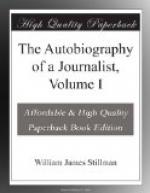And Agassiz’s disposition was as generous as large. He had absolutely no scientific jealousy or sectarian feeling. The rancor which was shown him by some of the Darwinians never disturbed his serenity an instant; for of the world’s opinion of him and his ideas, even when the “world” was scientific, he never took account other than to regret that science was the loser, by running off on what he considered side issues. We had much conversation on the question of evolution and allied topics, in which my part was naturally that of listener and only occasional questioner, and I remember the warm appreciation he always expressed for Darwin and his researches, for his fineness of observation and scientific honesty. He regarded the widespread acceptance of the theory of natural selection as one of the epidemics which have swept the scientific world from time to time, and looked with absolute serenity to the return of science one day to the conception of creation by design.
I am neither qualified nor disposed to pass judgment on Agassiz as a scientist, or institute any kind of comparison of his relative authority, and probably the time is far away at which his comparative eminence can be estimated impartially. I have only to do with his personality as it appeared to me in our relations, and, as the latest survivor of those who enjoyed that greenwood intimacy, to put on record my impression of the great, lovable, magnanimous man. Of his unbounded generosity and indifference to personal advantage, his freedom from scientific jealousy, everybody who came in contact with him was witness. He refused all offers of emolument from any quarter, and spent all his surplus earnings for the aggrandizement of the great natural-history museum he founded at Cambridge. The propositions of the Emperor Napoleon III. he had declined with thanks as soon as made, and without a thought. He had come to America to study natural history, and did not propose to be diverted from this purpose. To a lecturing agent who offered him a very large sum for delivering a course of lectures in the principal cities of the Union, he replied that he had no time to make money; and he died of overwork, insatiate in the pursuit of the completion of his museum and the classification of his observations. I have heard him speak with pain of the animosity shown him by a Swiss associate in his glacial investigations, who had once been his warm advocate, but there was no bitterness in his manner. I am convinced that there was no bitterness in him, and that all personal feeling was overshadowed and minimized by his absolute devotion to scientific truth, with his loyalty to which nothing ever interfered.




